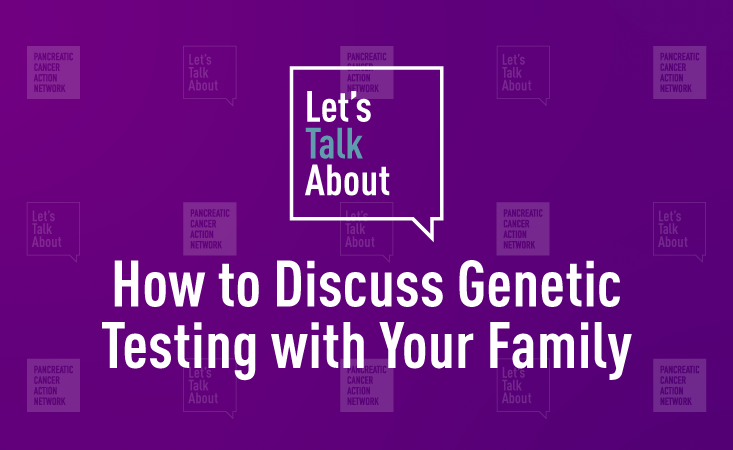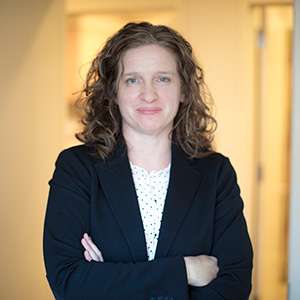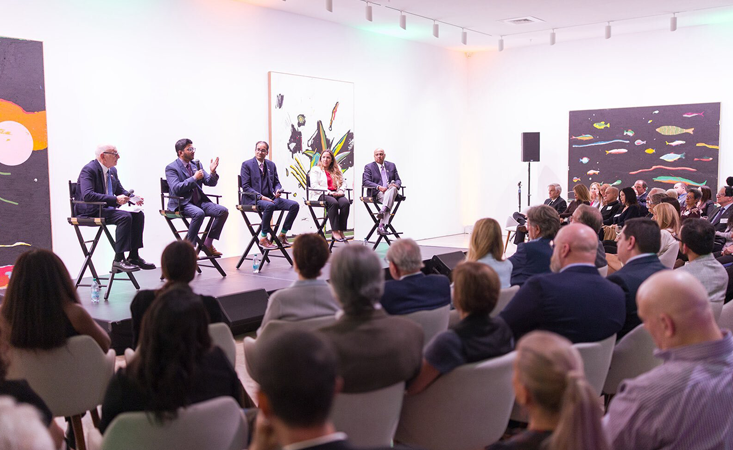
Editor’s note: Our “Let’s Talk About” series continues, focusing on testing as part of our Pancreatic Cancer Awareness Month campaign: “Talk. Test. Take Control. Three simple steps that can save your life.”
PanCAN strongly recommends that pancreatic cancer patients speak with their doctor to get biomarker testing of their tumor tissue and genetic testing for inherited mutations. Results from genetic testing can help determine if other family members may be at risk and help the patient make more informed treatment decisions.
If you are someone who has had a parent, child or sibling diagnosed with pancreatic cancer, contact PanCAN Patient Services to help you understand why you should consider genetic testing for inherited risk.
Here today to discuss how to have a productive, useful conversation with your family about family medical history and genetic testing are genetic counselors Jessica Everett, MS, CGC, and Shenin Dettwyler, MS, CGC. They are both with the Pancreatic Cancer Center, Perlmutter Cancer Center, NYU Langone Health, where Jessica also serves as clinical assistant professor of medicine.
PanCAN: Many families will be gathering for Thanksgiving this week and it could be a good time to discuss family medical history and genetic testing. How would you recommend starting the conversation?

Jessica Everett, MS, CGC, genetic counselor at NYU Langone Health
JE: I really like the idea of families discussing their family history in general during Thanksgiving – it’s a natural topic to dive into. And it can certainly be a natural opener to a more specific conversation about family cancer history and then from there, genetic testing.
To start the medical history conversation, you could say something like, “While we’re all together, why don’t we make sure we’re up-to-date on any cancer history in the family.”
Find out as much as you can about things like who in the family has had cancer, when, how old they were when they had it and whether they had cancer in more than one area of the body.
SD: I agree with this approach of using family togetherness as a storytelling time and then weaving in information about medical history. It can feel really empowering to share and openly discuss. Another idea for information gathering is to talk to the family “historian.” A lot of families have someone who knows much about the family’s history and that can be a good person to start with. Also, I think it’s important for as many family members as possible to know the family history and not just rely on the older members of the family to know everything.
JE: Speaking of the family historian, in my own family, I know who I would go to right now for answers about family medical history. Many of us can likely identify that person pretty easily. You might want to reach out to them before the family gathering, if they are coming, and say that they could be a really big help at Thanksgiving, telling them what you want to talk about and why.
PanCAN: Talking about family medical history or history of cancer can certainly be informative and educational. How do you bridge the conversation from disease history to genetic testing?

Shenin Dettwyler, MS, CGC, genetic counselor at NYU Langone Health
JE: The topic of genetic testing is really part of the same conversation – how can we make sure people in our family have the information they need to protect their own health. If you have had genetic testing or are thinking about having it, as genetic counselors we encourage you to share that decision with your family as quickly as possible. Often, I will tell my patients, especially if they are anxious about bringing up the topic with family, to talk more generally about testing and even ask them how they would feel about having it done. You can make it more of a philosophical discussion.
SD: There are a few concerns that I hear of frequently regarding genetic testing and that may come up when you have this conversation with your family. One is, is it expensive, and the other is, is my information kept private in the age of data breaches or the news headlines about how some tests are used to track down criminals, etc. I let patients know that genetic testing is more affordable than ever and that results are strictly confidential.
PanCAN: What if there is a family member with pancreatic cancer who is there for the conversation about genetic testing?
JE: It’s important that the person in the family with pancreatic cancer has had genetic testing, too. But that may not have happened yet. You might say, “I learned that you are supposed to have been offered testing – has your doctor spoken with you about it yet?” If the answer is no, you could follow with, “It’s recommended for a couple of reasons – genetic and biomarker testing can be important in thinking about treatment options, including clinical trials, and there are things family members could do to better understand their risk for pancreatic cancer and other cancers, as well.”
PanCAN: Is there anything else that can be communicated to family members about genetic testing?
JE: Anyone in the family can meet with a genetic counselor at any time. If they have any questions about illness of any kind that has been in the family, genetic counselors are a great resource and can help you get your questions – and concerns – addressed.
For more information about genetic testing or preparing for a visit with a genetic counselor, you can also contact PanCAN Patient Services.
Up next: What you can do to be proactive if genetic testing results indicate a higher risk for developing pancreatic cancer?














